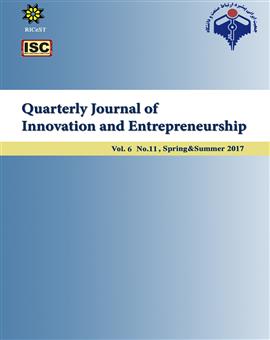The effect of knowledge accumulation capabilities and organizational size incremental and radical innovation performance
Subject Areas : عمومىabbas ghavami 1 , Amir Najafi 2
1 -
2 -
Keywords: Knowledge accumulation capacity, organization size, gradual innovation performance, radical innovation performance,
Abstract :
This study aimed to determine the effect of different capacities, knowledge accumulation and the size of incremental and radical innovation performance (Case Study: Karafarin, Asia, Iran Insurance companies and social security organization) has been made. The research methods, descriptive (cross-sectional) and the aim of the research is applied and the type of field research among. The population of this research included all employees of Karafarin, Asia, Iran Insurance companies and social security organization a total of 224 persons. Morgan table was used to select the sample of the sample number to the number 224 with a reliability of 95 percent to 138, respectively. For sampling stratified random sampling was used. The results showed assumptions, knowledge production capacity within the organization, on the performance of incremental innovation, the capacity to absorb external knowledge, and radical innovation performance with variable adjustment of external knowledge absorption capacity through significant indirect effects. Also The absorption capacity of external knowledge on the performance of incremental innovation, radical innovation performance has a significant impact. The results showed that the size of the capacity of organizational knowledge, the capacity to absorb external knowledge, the incremental innovation and radical innovation performance has a significant impact
1) حكمت، معصومه، (1392)، «تأثير مديريت دانش بر عملكرد سازماني»، پاياننامة كارشناسي ارشد، دانشگاه آزاد اسلامي واحد بروجرد، دانشكدة مديريت.
2) عبدالملکی، شوبو، نصیری ولیک بنی، فخرالسادات، قنبری سیروس، (1395)، «بررسی رابطه ویژگیهای شخصیتی کارآفرینی مدیران با بهره وری و عملکرد شغلی آنان»، فصلنامه نوآوری و ارزش آفرینی، شماره 4، دوره 8.
3) عبدالهي، سيدمحمد. (1393). «بررسي تأثير مديريت دانش بر يادگيري و خلاقيت سازماني از ديدگاه مديران دستگاههاي اجرايي استان اردبيل»، اولين همايش ملي اقتصاد و مديريت با رويكرد ملي،دانشگاه مازندران، بابلسر.
نوري، محمد، (1395)، «نقش اندازه بر ساختار مدیریت سازمان فرهنگ و ارتباطات اسلامی»، فصلنامه مطالعات مديريت، شماره 12، دوره 8.
4) يوسفي، احسان، صادقفيضي، جعفر و محمد سليماني، (1391)، «بررسي ميزان تأثير مديريت دانش بر نوآوري»، فصلنامة ابتكار و خلاقيت در علوم انساني، سال اول، شمارة 3، ص 51-29.
5) حاجی حسینی، حجت اله، رمضانپور نرگسی، قاسم، سلطان زاده، ثمینه، (1396)، «عوامل سازمانی موثر بر بهره وری مراکز انتقال فناوری دانشگاهی»، ، فصلنامه نوآوری و ارزش آفرینی، شماره 5، دوره 10.
6) مردانشاهی، محمد مهدی، آقاجانی، حسنعلی، (1395)، «نقش آموزش کارآفرینی بر افزایش خلاقیت دانشجویان»، ، فصلنامه نوآوری و ارزش آفرینی، شماره 4، دوره 8.
7) Fındıklı, M. A; Yozgat, U; and Yasin Rofcanin. (2015). “Examining Organizational Innovation and Knowledge Management Capacity The Central Role of Strategic Human Resources Practices”, 3rd International Conference on Leadership, Technology and Innovation Management.
8) Swart, J; and Nicholas, K. (2015), “Organisational learning, knowledge assets and HR practices in professional service firms”, Human Resources Research Management Journal, 20(1), pp. 64-79.
9) Darroch, J; and McNaughton, R., (2014), “Examining the link between knowledge management practice and types of innovation”, Journal of Intellectual Capital, Vol.3, No.3, pp. 210-222.
10) Beatriz Forés a, César Camisó (2016)." Does incremental and radical innovation performance depend on different types of knowledge accumulation capabilities and organizational size?", Journal of Business Research 69 (2016) 831–848.
11) AL-Hakim, Laith Ali Yousif and Shahizan Hassan. (2014). “Who are the Crew Members on Implementation of Knowledge Management Strategies to Enhance Innovation and Improve Organizational Performance, Journal of Resources Development and Management, Vol. 3, No. 2, pp 54-64.


